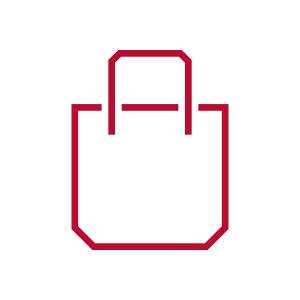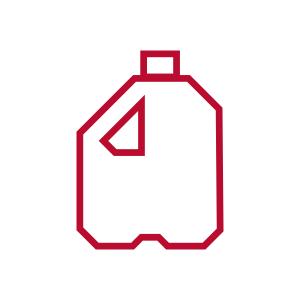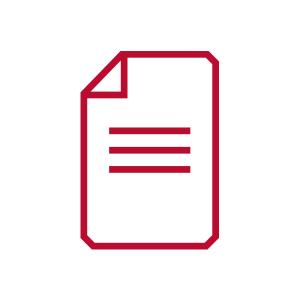Minimizing Waste Across Campus
Ohio State is working to achieve zero waste by diverting 90% of waste away from landfills. Campus diversion rate performance will be significantly impacted by educating students, faculty and staff and providing ample opportunities to recycle, prevent and minimize waste.
Contact recycle@osu.edu for more information.
RECYCLE RIGHT AT OHIO STATE

Plastic bags
Plastic bags get caught in the recycling facility sorting equipment, causing expensive time delays and fixes. Recycle plastic bags at your local grocery store.

Napkins, paper towels, tissues
Napkins, paper towels, tissues, etc., cannot be recycled. Often, these items can be composted, but if compost bins are unavailable, please discard them into the trash.

Plastic Cups, Jugs, Tubs, Bottles, Clamshells
Recycle cups, jugs, bottles, tubs (jello, fruit, cottage cheese, etc.) and clear clamshell containers (berries, eggs, take-out).

Recycling Poster
Download the recycling poster to print and display in your office or building.
What Can I Recycle?
Plastic
Acceptable
- Plastic bottles and jugs
- Plastic cups (fountain drink cups - no Solo cups)
- Beverage bottles
- Clear carry-out containers
- Clear fruit, berry and lettuce containers
- Clear egg cartons
- Laundry detergent bottles
- Milk jugs
- Shampoo bottles
- Contact solution bottles
- Plastic tubs
- Yogurt containers
- Sour cream tubs
- Butter tubs
- Jello containers
- Cottage cheese tubs
- Whipped topping
- Specialty dips (salsa, guacamole, French onion)
- Fruit cups
- Please reattach lids!
Unacceptable
- Anything contaminated with food, grease, oils
- Plastic bags (recycle at your local grocery store)
- Plastic knives, forks, spoons
- Candy wrappers
- Straws
- Shrink/bubble wrap
- Foil juice pouches
- Styrofoam
- Packing peanuts (Styrofoam)
- To-go food containers (Styrofoam)
- Potato chip bags
Glass
Acceptable
- Bottles (any color)
- Jars (any color)
- Non-heat resistant laboratory glassware (see Specialty Recycling)
Unacceptable
- Heat resistant glass (see Specialty Recycling)
- Bio-contaminated or infectious glass (see Specialty Recycling)
- Any chemically contaminated glass (see Specialty Recycling)
- Light bulbs
- Window glass
- Drinking glasses
- Mirror glass
- Ceramics/Pottery
- Broken glass
Paper and Cardboard
Acceptable
- Any corrugated cardboard boxes (flattened)
- Paperboard packaging, beverage boxes, cereal boxes
- Paper packing material
- Aseptic cartons (soy milk, orange juice cartons)
- Pizza boxes (unsoiled or soiled)
- Paper cups (fountain drink cups, coffee cups)
- Office paper
- Printer paper
- Junk mail
- Magazines
- Phone books
- Soft cover books (see Specialty Recycling for hardcover books)
- Newspapers
- Post-it notes
- Manila folders
- Brown paper bags
- * In the Wexner Medical Center, help us protect patient privacy by placing all paper documents in shredding bins. Documents placed in the shredding bin cannot be removed and will be destroyed.
Unacceptable
- Anything contaminated with food, grease, oils
- Tissues
- Paper towels
- Napkins
- Coffee cups (recycle cardboard sleeve)
- Food wraps
- Paper plates
Metal
Acceptable
- Aluminum cans
- Tin/Steel cans (rinsed)
- Aerosol cans (see Specialty Recycling for details)
Unacceptable
- Anything contaminated with food, grease, oils
SPECIALTY RECYCLING
Ink/Toner Cartridges
As part of the Stores Toner Recycling Program, schedule a pickup of empty toner cartridges with Central Receiving (614-292-2694) or online at: u.osu.edu/receivingmail/returns
Electronics
For university electronics, such as computers and cell phones, contact OSU SURPLUS (614-688-3545).
Batteries
Recycle batteries through Environmental Health and Safety. Start a program in your office by placing a box or 5 gallon bucket in a common area with a sign for batteries. When full, contact EHS to schedule a collection (614-292-1284).
Chemicals
Many materials that laboratories submit as chemical waste are actually surplus chemicals that may be reused. To assist in waste reduction, the Environmental Health and Safety Chemical Management Program accepts both opened and unopened containers of unwanted, usable chemicals from laboratory and service areas throughout campus. The Chemical Management Program takes the unwanted chemicals and redistributes them, free of charge, to other Ohio State operations. Chemicals can be requested by registering at the EHS website. Contact EHS (614-292-1284) for additional information.
Surplus
If you have university assets that need disposal, please work with your asset manager to release the items to Surplus. For additional questions, contact Surplus (614-688-3545).
Heat Resistant Glass
Heat resistant glass is not recyclable at this time. Please dispose of these materials in the trash. Broken heat resistant glass should be bagged, placed in a cardboard box, and disposed of in a trash dumpster.
Infectious or Bio-Contaminated Glass
All infectious or bio-contaminated glass must be placed into an infectious waste box or sharps box. These materials are managed by Environmental Health and Safety (614-292-1284).
Chemically Contaminated Glass
All chemically contaminated glass must be placed into the blue sealable chemical barrels. These materials are managed by Environmental Health and Safety (614-292-1284).
Aerosol Containers
Must be empty, depressurized, and cannot have contained hazardous materials. Do not empty old containers. Contact Environmental Health and Safety to arrange for proper disposal (614-292-1284).
Metals of Value or of University Property
Must be disposed of through appropriate Ohio State policies and procedures. Contact the Solid Waste Shop (614-292-3974) for arrangements.
Non-Heat Resistant Laboratory Glassware
Must be triple-rinsed. Note that any rinsate becomes hazardous waste. These materials are managed by Environmental Health and Safety (614-292-1284).
Frequently Asked Questions
Why recycle?
There are many important reasons to minimize, reduce, and recycle materials at Ohio State.
- Recycling conserves scarce natural resources such as oil, water, minerals, and trees.
- Recycling helps reduce water and air pollution.
- Recycling conserves energy as it takes less energy to make new products from recycled materials compared to using virgin materials.
- Recycling reduces harmful greenhouse gas emissions by decreasing the amount of trash dumped in landfills and the amount of methane emitted to the atmosphere.
- Recycling is an easy and efficient way to participate in the university's sustainability initiatives.
How can I recycle at Ohio State?
Recycling at Ohio State is single stream (also referred to as co-mingled), meaning all recyclables are placed in the same bin instead of being separated. However, trash still needs to be placed in a different container. Many side-by-side trash and recycling containers have been placed around campus in common areas and classrooms.
Do you have recycling signage on campus?
- Yes, recycling signage is available at recycling bins throughout campus. Advanced Drainage Systems (ADS) and Rumpke Waste and Recycling provided funding for signage at various locations in support of zero waste initiatives. Information about recycling is also shared on websites, via e-newsletters, social media, digital signage and more.
Do you provide document destruction services?
We do not have certification to provide document destruction services. For a list of all certified shredding providers that meet the university's PCI requirements, please contact the Office of Financial Services at 614-292-7792.
Where can I recycle books?
Donations are accepted at University Libraries Tech Center.
Where can I recycle ink cartridges?
Contact OSU STORES at 614-292-2694 to arrange recycling or fill out the online form. You can also recycle cartridges through Earth911.
Where can I recycle electronics?
For electronics such as computer parts contact OSU SURPLUS at 614-688-3545
How do I recycle batteries?
Contact Environmental Health and Safety at 614-292-1284
How do I request additional recycling containers for student move in and move out?
Contact Service2Facilities at 614-292-HELP if you need any additional recycling containers.
How does the Wexner Medical Center recycle?
Red recycling bins can accept cardboard, paper cups, glass, aluminum, bottle-shaped plastics, cups, jugs, tubs and clear clamshell or hinged-lid containers.
Help us protect patient privacy by placing all paper documents in shredding bins. Documents placed in the shredding bin cannot be removed and will be destroyed.
Where can I learn more about recycling in Columbus?
Learn more by visiting the City of Columbus.
How can I order indoor recycling/trash can sets for my building?
- Log in to Workday and select Request Travel or Purchase from the Applications menu.
- On the next page, choose Request to procure goods and/or services.
- On the Requisitions page:
- Under Requisition Details, update your Worktags if needed.
- Then, click Start Requisition.
- In the Search for Goods and Services window, order the following items:
Recycling Bin:
- For University buildings*:
Search for 10168362
Select the item:
ERGOCAN UNIV RECYCLING ONLY SIDE BY SIDE CONTAINER 30 GALLON WITH LIDS & PANELS : MON-SAY CORP
Enter the quantity needed and click Add to Cart. - For Wexner Medical Center buildings*:
Search for 10168363
Select the item:
ERGOCAN MED CENTER RECYCLING ONLY SIDE BY SIDE CONTAINER 30 GALLON WITH LIDS & PANELS : MON-SAY CORP
Enter the quantity needed and click Add to Cart.
Trash Bin:
- Search for 10044124
Select the item:
ERGOCAN TRASH ONLY SIDE BY SIDE CONTAINER 30 GALLON WITH LID & PANELS : MON-SAY CORP
Enter the quantity needed and click Add to Cart.
- When all items are in your cart:
- Click the shopping cart icon in the top right corner.
- Review your order and click Submit.
* Recycling bins vary slightly between University and Wexner Medical Center buildings:
Wexner Medical Center bins do not display “paper” as an accepted material due to patient data protection protocols, whereas University bins do include paper as an acceptable item.
Best Practice: Always pair a trash bin with a recycling bin to support proper waste sorting.
